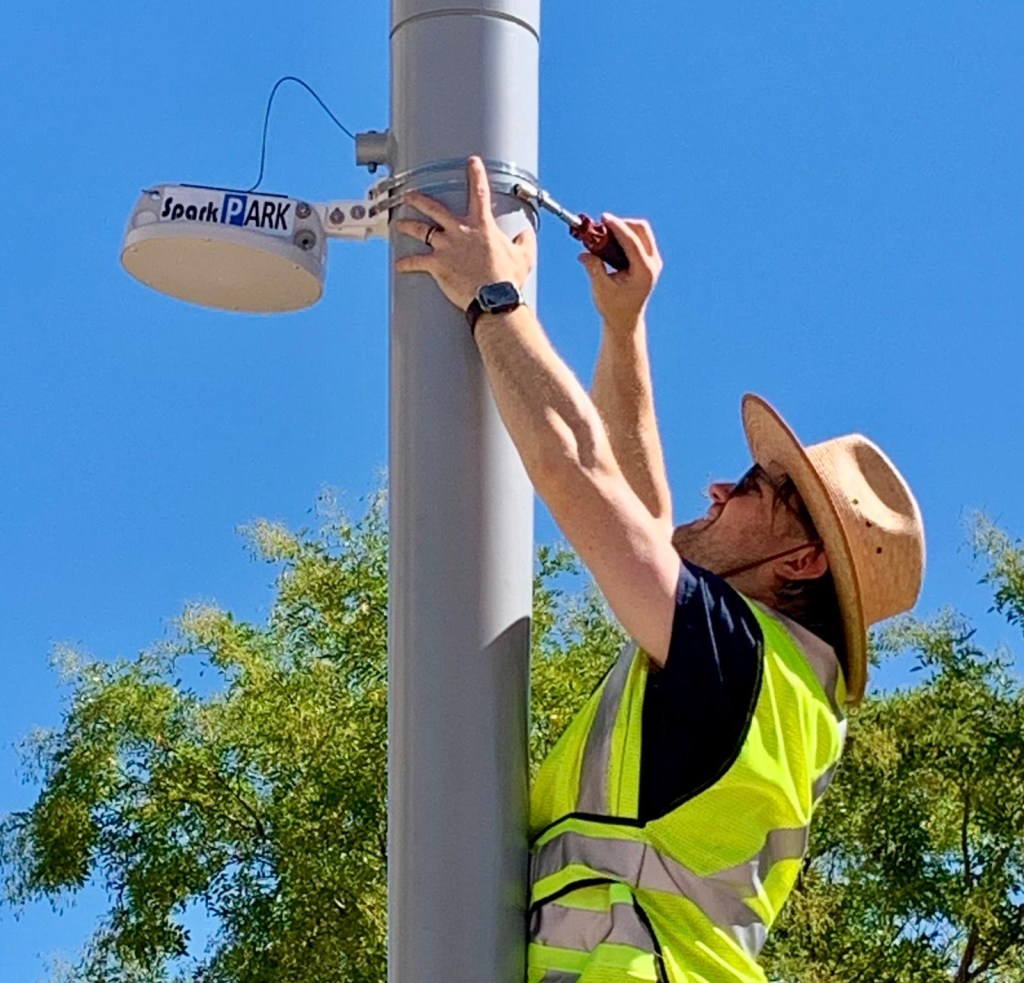
Hannah Metzger

Audio By Carbonatix
As rentable electric scooters and bikes take over the Denver area, sidewalks are increasingly littered with the devices, blocking paths for pedestrians.
Denver South is testing a new solution to clear the way for communities in the south metro region. The organization, made up of business leaders and public officials across the south metro, launched the first North American pilot program of the Sparkpark high-precision scooter parking system on Friday, October 3.
Sparkpark uses Bluetooth antennas to pinpoint the location of scooters and designate virtual docking stations for the vehicles. Under the pilot program, scooter riders can still park outside of the docking stations, but those who use the stations will receive incentives such as ride credits, gift cards or merchandise.
“Denver South is proud to lead the nation in testing Sparkpark’s innovative micromobility system,” Daniel Hutton, Denver South’s vice president of transportation and mobility, says in a statement. “Launching this pilot allows us to gather real-world data, explore new ways to reduce sidewalk clutter and encourage responsible scooter and e-bike use.”
Ten docking stations will be deployed in Greenwood Village and Centennial by the end of the year, including near Fiddler’s Green Amphitheatre. The pilot program is set to run through July 1, with the first few months dedicated to calibrating the system. Incentives for using the docking stations will roll out in early 2026.

Daria Cutler
The program comes amid widespread complaints from metro residents about scooters clogging sidewalks, particularly inconveniencing people who use wheelchairs and mobility aids. Those concerns are amplified in downtown Denver and Capitol Hill, where scooter riding is more prevalent.
So far this year, residents have taken nearly 4.1 million e-scooter trips within Denver, according to the city’s micromobility dashboard.
In May, the Denver City Council passed an ordinance requiring the establishment of mandatory parking zones in certain Denver neighborhoods by July 2026, including Union Station, Five Points and the Central Business District. The ordinance does not specify how the mandatory parking zones should be enforced, leaving the specific rules and regulations up to the Denver Department of Transportation & Infrastructure, while micromobility companies must communicate the new parking requirements to users.
Denver South is an “ideal pilot candidate” for its parking program because only one micromobility company, Spin, is permitted to operate in the area, according to spokesperson Daria Cutler. The City and County of Denver contracts with two vendors: Lime and Bird.
“Denver South and its partners have an enterprise services contract directly with Spin,” Cutler says. “Because our program has a dedicated contract, it’s a lot easier for us to test things out and pilot at a smaller scale. Denver has a large service area to consider.”
“Starting in Denver South allows us to test the technology in a real-world setting with committed partners, gather data, and build a model that can be expanded to other communities, such as Denver, in the future,” she adds.
Sparkpark, a Norway-based company, claims its Bluetooth technology tracks scooters down to the centimeter, describing the tech as more accurate and reliable than the traditional GPS technology used by many micromobility companies, which can be disrupted by tall buildings or underground parking structures.
“We are thrilled to bring Sparkpark’s technology to the United States for the first time,” says Thomas Bråten, co-founder of Sparkpark, in a statement. “Shared e-scooters and e-bikes are now part of everyday life in U.S. cities, but crowded sidewalks have shown the need for smarter solutions. With the right technology, micromobility can stay convenient without disrupting public space.”